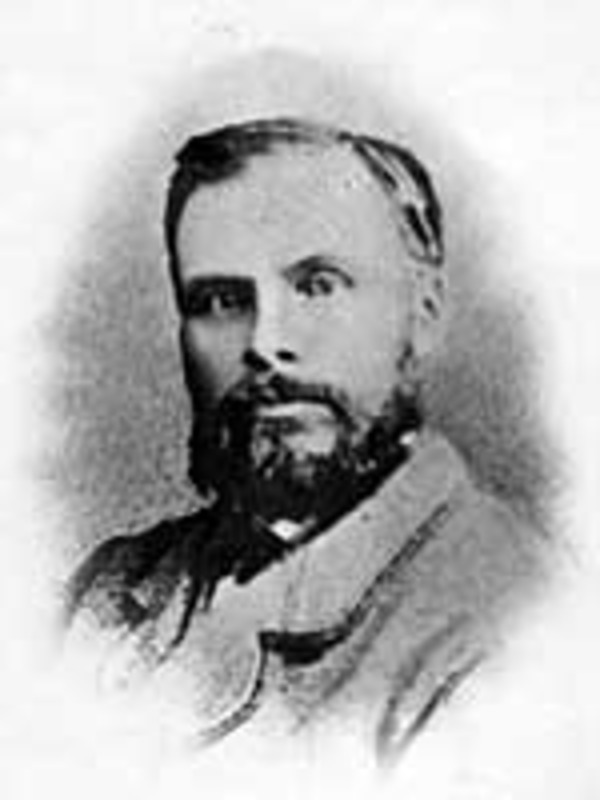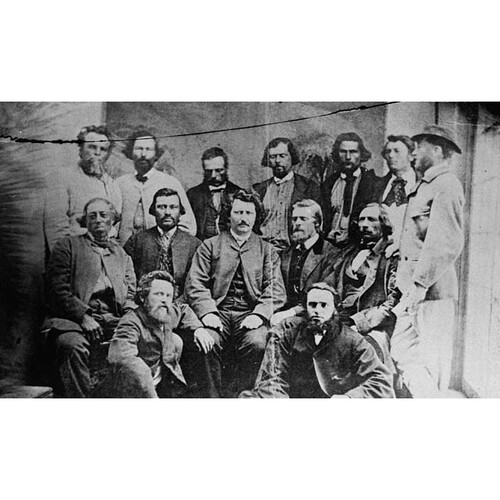
Source: Link
BUNN, THOMAS, lawyer, legislator, and politician; b. 16 May 1830 in the Red River Settlement, eldest son of Dr John Bunn* and Catherine Thomas; m. Isabella Clouston in 1854, and Rachel Harriott in 1859; d. 11 April 1875 at St Clements, Man.
Thomas Bunn was raised in the parish of St Paul (Middlechurch) and educated at the Red River Academy, and he settled in the parish of St Andrews. Bunn’s mother was of part-Indian blood; his father was a local doctor and councillor of Assiniboia; Bunn himself became a member of the Church of England and a freemason. He was able, therefore, to have some influence in the Indian community and to enter English society in Red River. In January 1868 Bunn was appointed a member of the Council of Assiniboia and held this office until the council ceased to function in September 1870. On 17 Dec. 1869 he succeeded W. R. Smith as executive officer of the council with a salary of £100 per year.
In 1869 Louis Riel* had begun to organize resistance to the transfer of the North-West to the dominion of Canada without prearranged terms. Bunn was elected a representative from St Clements to the council of English and French parishes convened on 16 Nov. 1869 to draw up terms for entry. He hoped for a united front to negotiate these terms of union with Canada. Most English settlers, however, were disposed to think that Canada would be just, and if it were not, that Great Britain would ensure a fair settlement. Many English were willing to support Riel’s policy of union through negotiation, not so much because they thought negotiation was necessary, but because they hoped thus to preserve peace in the Red River Settlement. Bunn tried indeed to pursue an intermediate position, and the strains were sometimes great. By accepting Riel’s policy, Bunn, in a sense, made himself Riel’s English half-breed lieutenant, despite the fact that there was no bond between the men.
On 19 and 20 Jan. 1870, a mass open-air meeting was held to hear Donald Alexander Smith*, commissioner of the Canadian government. Bunn was chairman of the discussion. It was decided that a convention should be held to prepare terms for negotiations with Canada, and that delegates should be elected. Bunn was one of those appointed to a committee to arrange the elections. He himself became a delegate from St Clements. From 27 January to 3 February, the convention prepared a second list of rights and approved the formation of a provisional government. Riel made Bunn secretary of state in the provisional government.
On 24 August the military forces of the crown under Colonel Garnet Joseph Wolseley* reached Upper Fort Garry (Winnipeg) and the provisional government was swept from power. Bunn survived its fall and may have been present at a meeting of the Council of Assiniboia which Wolseley revived in an attempt to settle the situation. Indeed, Bunn continued as usual in Red River society and set out to establish himself in the new order. As a man of some education and a fluent speaker with a judicious cast of mind, he decided to go into law. He was called to the bar of the new province of Manitoba in 1871, and was clerk to the First General Quarterly Court held in the new province on 16 May 1871. St Clements returned him as its first member to the provincial Legislative Assembly on 30 Dec. 1870. Thus Bunn’s career decidedly bridged the way from the old order to the new. His early death in 1875 cut short his passage into it.
Begg’s Red River journal (Morton). Canadian Northwest (Oliver), I, 71, 582, 620. Rapport du comité spécial sur les causes des troubles du Territoire du Nord-Ouest en 1869–70 (Ottawa, 1874), 114–19. R. B. Mitchell, Medicine in Manitoba; the story of its beginnings ([Winnipeg, 1955]), 42. J. H. O’Donnell, Manitoba as I saw it from 1869 to date, with flash-lights on the first Riel Rebellion (Winnipeg and Toronto, 1909), 60.
Cite This Article
W. L. Morton, “BUNN, THOMAS,” in Dictionary of Canadian Biography, vol. 10, University of Toronto/Université Laval, 2003–, accessed December 28, 2025, https://www.biographi.ca/en/bio/bunn_thomas_10E.html.
The citation above shows the format for footnotes and endnotes according to the Chicago manual of style (16th edition). Information to be used in other citation formats:
| Permalink: | https://www.biographi.ca/en/bio/bunn_thomas_10E.html |
| Author of Article: | W. L. Morton |
| Title of Article: | BUNN, THOMAS |
| Publication Name: | Dictionary of Canadian Biography, vol. 10 |
| Publisher: | University of Toronto/Université Laval |
| Year of publication: | 1972 |
| Year of revision: | 1972 |
| Access Date: | December 28, 2025 |




